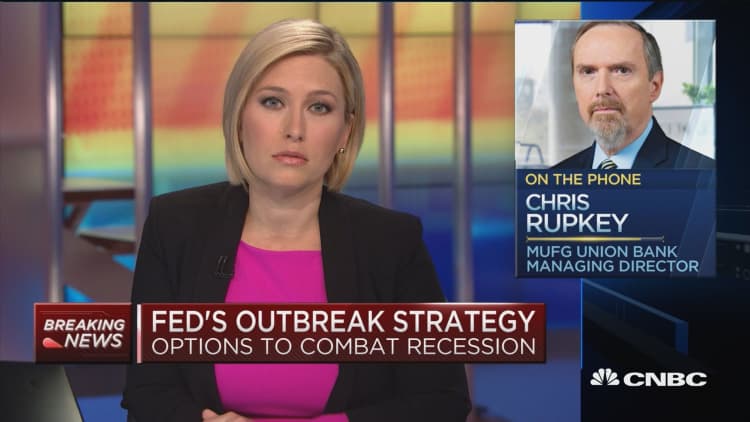
Stocks surged Tuesday — rebounding from their worst day in more than three decades — as Wall Street cheered White House plans that could inject $1 trillion into the U.S. economy to cushion the blow of the coronavirus.
The Dow Jones Industrial Average closed 1,048.79 points higher, or 5.2%, at 21,237.31. It briefly dipped below 20,000 for the first time since February 2017 before rebounding. The S&P 500 was up 6% at 2,529.19 while the Nasdaq Composite gained 6.2% to end the day at 7,334.78.
The Trump administration is weighing a fiscal stimulus package of more than $1 trillion that includes direct payments to Americans, according to a source familiar with the matter. Earlier, Treasury Secretary Steven Mnuchin told reporters the government is considering directly sending checks to Americans in the next two weeks. "Americans need cash now," he said.
Mnuchin added corporations will be able to defer tax payments of up to $10 million while individuals could defer up to $1 million in payments to the Internal Revenue Service. Mnuchin also said President Donald Trump authorized the deferral of $300 billion in IRS payments.
"We know there's going to be monetary policy. We know there's going to be fiscal policy and we're hearing more about that. That's two legs of the stool," said Art Hogan, chief market strategist at National Securities. "The federal health care policy response, that's another one. I still think the information on that needs to get better."
"We've done a lot of recalibration of equity values, all based on an assumption of how much economic damage is done, but we won't know exactly how much damage for a period of time," said Hogan. "One thing I'm sure of is the markets will have found a bottom long before the news starts to get better."
Treasury yields jumped, with the 10-year U.S. rate breaking back above 1% on news of the big stimulus plan. Yields move inversely to prices. The iShares 20+Year Treasury Bond ETF (TLT) dropped more than 6% as investors fled bonds for stocks.
The Federal Reserve announced measures to help companies struggling to get short-term funding amid the outbreak. The market has been hampered by a lack of demand for paper issued, and Wall Street has been looking for central bank intervention along the lines of what happened during the financial crisis.
Amazon shares jumped 7% after an analyst at Bank of America noted the e-commerce giant will benefit from the global "in-home shift" due to the coronavirus. Netflix climbed 7% as well while Apple closed 4.3% higher.
Biotech giant Regeneron, meanwhile, said Tuesday morning that it's aiming to have doses of a potential drug for COVID-19 ready to start human clinical trials by early summer. The announcement, which represents a marked acceleration in the company's drug timeline, sparked a 11.5% rally in the company's equity.
More than 5,700 cases have been confirmed in the U.S. along with more than 90 deaths, according to data from Johns Hopkins University. President Donald Trump also said the crisis could stretch into August, adding the administration may look at locking down "certain areas."
The Dow and S&P 500 had on Monday their biggest one-day losses since 1987, falling 12.9% and 12%, respectively. It was also the Dow's third-worst day ever. The Nasdaq Composite had its biggest one-day plunge ever, tumbling 12.3%.
"Yesterday was a real washout," said Peter Cardillo, chief market economist at Spartan Capital Securities. "I think we'll have a recession. It's just a question of how steep it will be."
The Cboe Volatility Index (VIX) — Wall Street's preferred fear gauge — posted its highest-ever close at 82.69. That tops the financial crisis' peak of 80.74. On Tuesday, the VIX traded down 9.2 points at 73.2.
—CNBC's Thomas Franck and Eustance Huang contributed to this report.
Subscribe to CNBC PRO for exclusive insights and analysis, and live business day programming from around the world.


